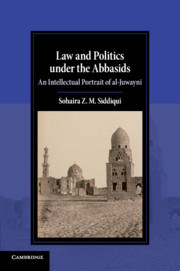Description
Law and Politics under the Abbasids
An Intellectual Portrait of al-Juwayni
Cambridge Studies in Islamic Civilization Series
Author: Siddiqui Sohaira Z. M.
Explores the eleventh century Abbasid Empire and the intersection between politics, theology, and law in the thought of Abu Ma'ali al-Juwayni.
Language: English
Subject for Law and Politics under the Abbasids:
Approximative price 34.17 €
In Print (Delivery period: 14 days).
Add to cart
Law and Politics under the Abbasids
Publication date: 06-2020
Support: Print on demand
Publication date: 06-2020
Support: Print on demand
Approximative price 107.81 €
In Print (Delivery period: 14 days).
Add to cart
Law and Politics under the Abbasids
Publication date: 04-2019
326 p. · 15.6x23.4 cm · Hardback
Publication date: 04-2019
326 p. · 15.6x23.4 cm · Hardback
Description
/li>Contents
/li>Biography
/li>
Abu Ma'ali al-Juwayni (d.478/1085) lived in a politically tumultuous period. The rise of powerful dynastic families forced the Abbasid Caliph into a position of titular power, and created instability. He also witnessed intellectual upheavals living amidst great theological and legal diversity. Collectively, these experiences led him to consider questions of religious certainty and social and political continuity. He noted that if political elites are constantly changing, paralleled with shifting intellectual allegiances, what ensures the continuity of religion? He concluded that continuity of society is contingent upon knowledge and practice of the Shari'a. Here, Sohaira Siddiqui explores how scholars grappled with questions of human reason and knowledge, and how their answers to these questions often led them to challenge dominant ideas of what the Shari'a is. By doing this, she highlights the interconnections between al-Juwayni's discussions on theology, law and politics, and the socio-political intellectual landscapes that forged them.
Introduction; Part I. Historical Background: 1. Politics, patronage, and scholarship in Nishapur; 2. Al-Juwaynī: life of a scholar; Part II. Epistemology: 3. Intellectual fissures: the Ashʿarīs and the Muʿtazila; 4. The epistemology of al-Juwaynī; Part III. Legal Theory: 5. Certainty in legal sources: Hòadīth; 6. Certainty in legal sources: Ijmāʿ; 7. The rise of legal uncertainty: Qiyās al-Maʿnā; 8. Coping with legal uncertainty: Qiyās al-Shabah; Part IV. Political Thought: 9. The search for continuity: al-Juwaynī's political thought; 10. Continuity, custom, and applied epistemology in al-Juwaynī's political thought; Conclusion.
Sohaira Z. M. Siddiqui is an Assistant Professor at Georgetown University, Qatar. She has published a series of articles in the Journal of Islamic Studies, Islamic Law and Society, the Journal of the American Oriental Society and Middle East Law and Governance. She is also the editor of a forthcoming volume entitled Locating the Shari'a: Legal Fluidity in Theory, History and Practice. She has held fellowships at the University of Cambridge and Harvard Law School and is a series editor for Sapientia Islamica, published with Mohr Siebeck.
© 2024 LAVOISIER S.A.S.

